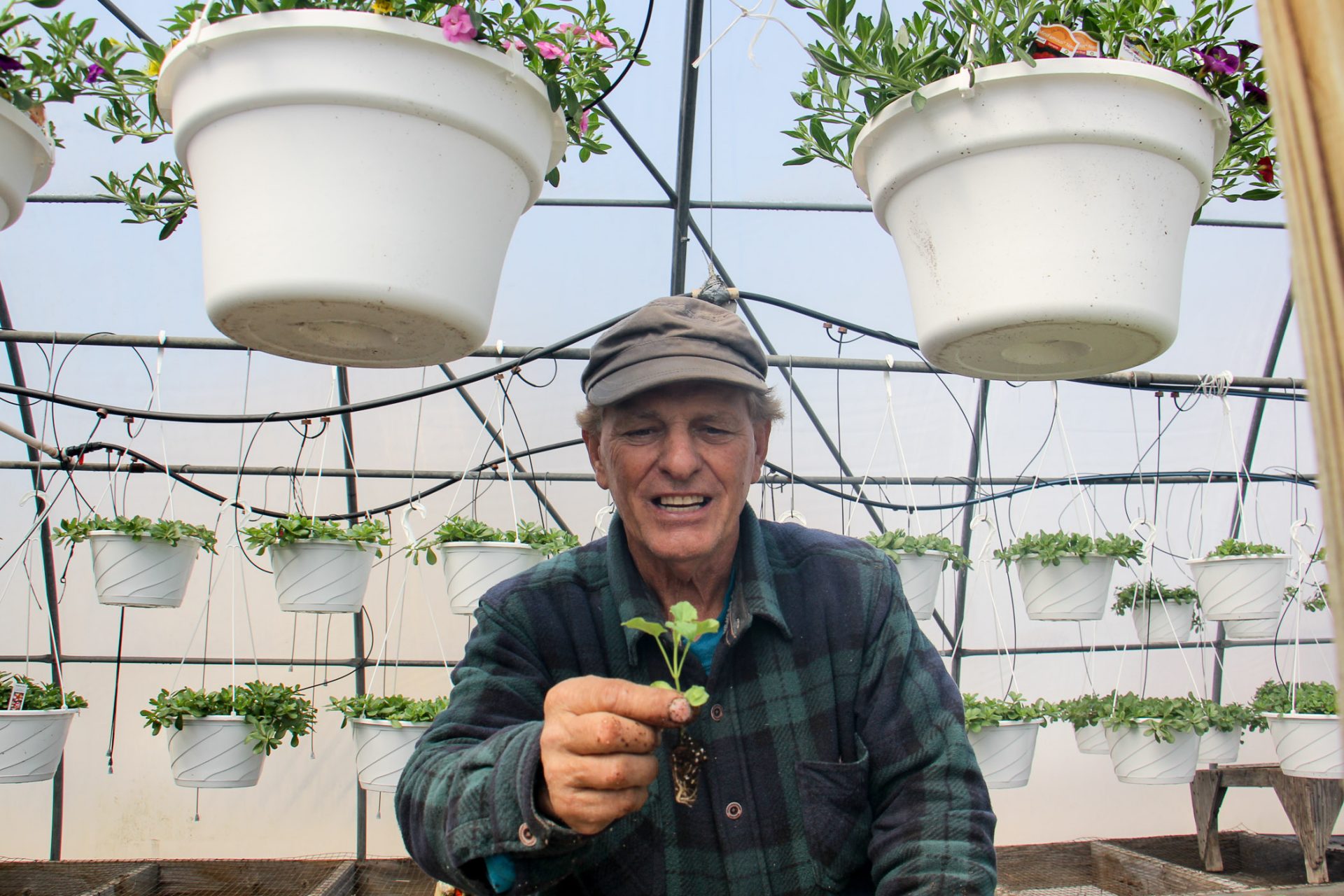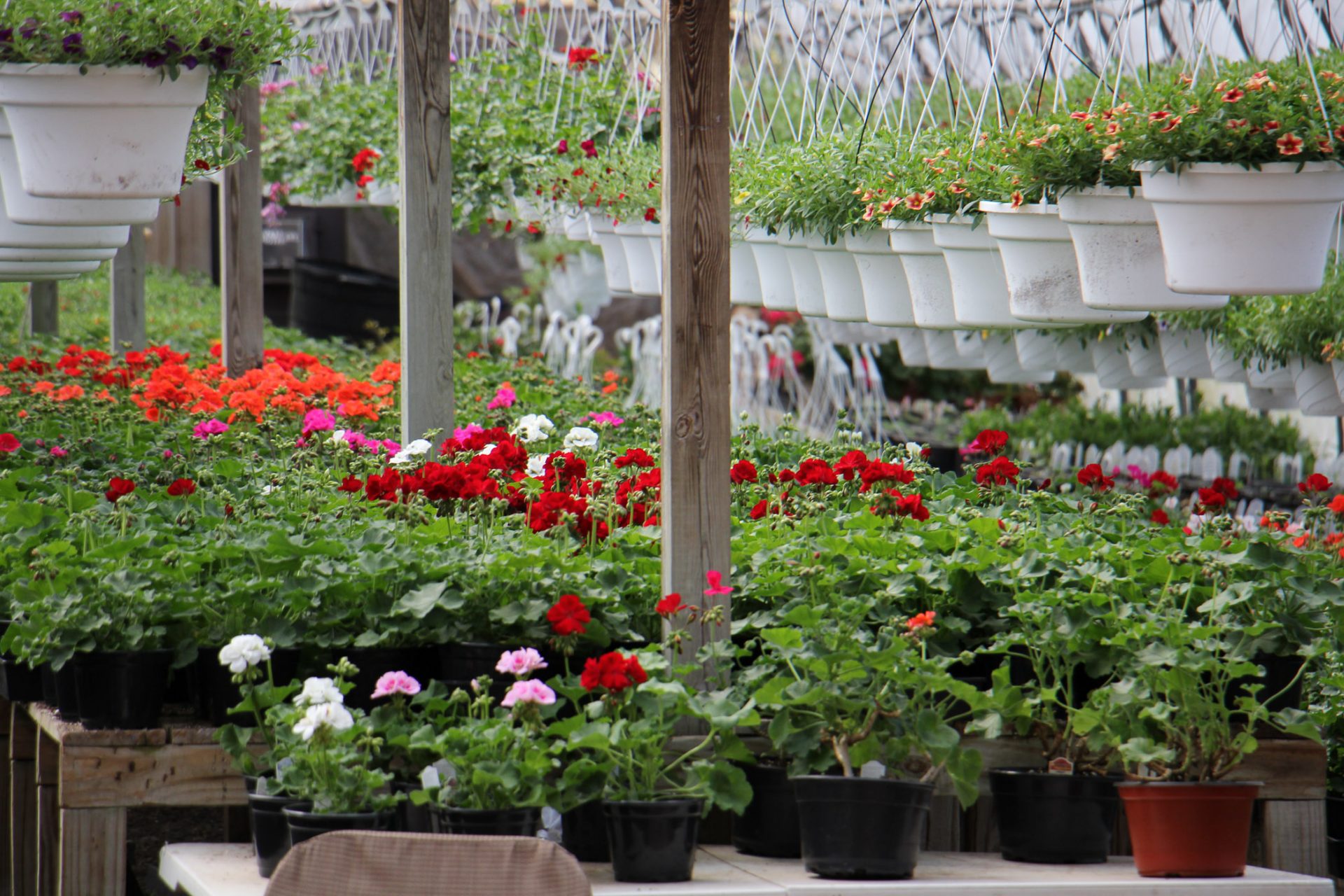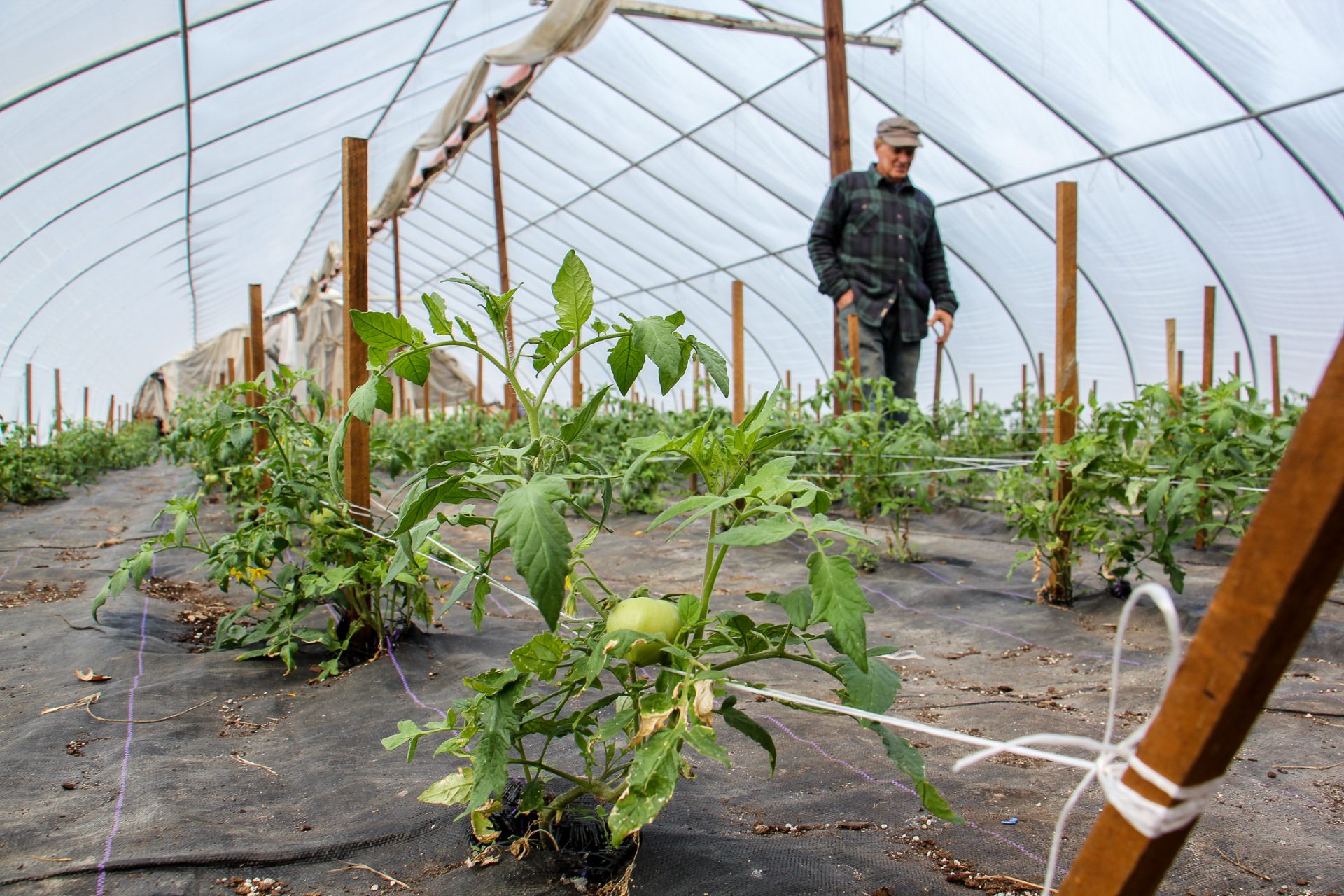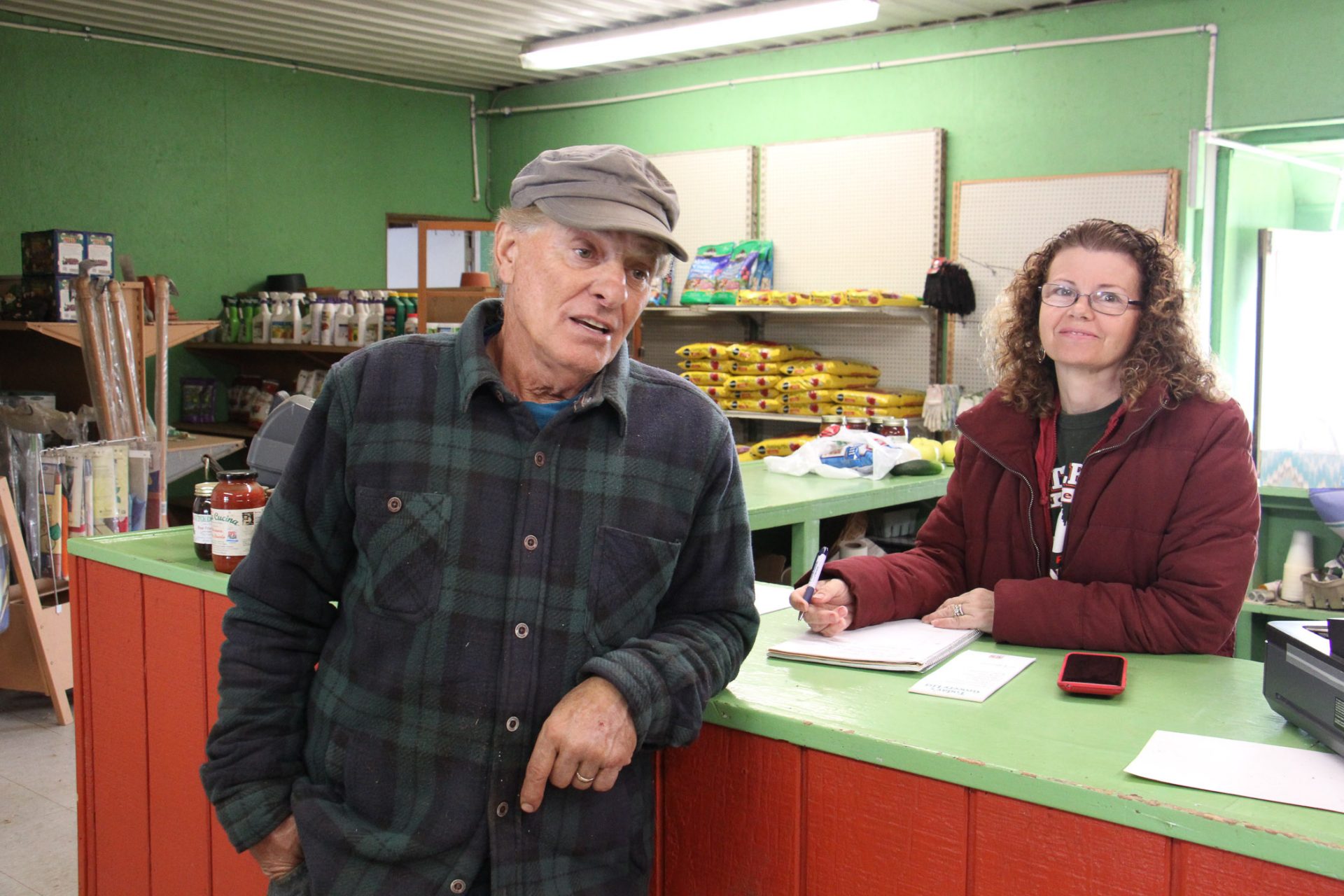
Ron Fox brings some tomato plants to a customer at his farm stand in Pittsgrove, N.J. (Emma Lee/WHYY)

Ron Fox brings some tomato plants to a customer at his farm stand in Pittsgrove, N.J. (Emma Lee/WHYY)

Ron Fox brings some tomato plants to a customer at his farm stand in Pittsgrove, N.J. (Emma Lee/WHYY)
What you should know
» Coronavirus facts & FAQ
» Day-by-day look at coronavirus disease cases in Pa.
» It’s time to get serious about social distancing. Here’s how.
It’s not as if farming 13 acres in South Jersey was very lucrative for Ronald Fox Jr. in good economic times. But with a global pandemic keeping people home through at least the end of April, Fox is bracing himself for the worst.
“I might not be able to get started back up again next year,” said the owner of the 60-year-old Fox’s Market in Salem County, “and this is what I’m worried about.”

Ron Fox repots a seedling in one of his greenhouses in Pittsgrove, N.J. (Emma Lee/WHYY)
Fox, 67, is one of thousands of farmers in New Jersey and Pennsylvania working hard to keep the region fed while facing down unprecedented uncertainty. Considered essential business owners, farmers like Fox can continue their operations, and with more people cooking at home, retail sales have seen a bump.
Stil, said Joel Rotz, a representative for the Pennsylvania Farm Bureau, “There’s little doubt that more farmers are going to go out of business.”
The New Jersey and Pennsylvania Farm Bureaus say wineries, commercial fishing, and floriculture have been hit the hardest so far. It’s too soon to know how many livestock farmers and fruit, vegetable and field crop growers have experienced losses, or by how much. For many farmers, their harvests and peak sales come in the summer.
Even if the best-case scenario plays out, and states like Pennsylvania and New Jersey can slow the spread of the virus and lift shutdown orders by May, farmers say it’s unclear how quickly consumers, and therefore restaurants and wholesalers, will resume their previous buying habits. State and federal aid is mainly coming in the form of loans, which some farmers worry they won’t be able to pay back.
Fox expects his first big loss to come Easter weekend. He keeps six greenhouses full of daffodils, tulips and hyacinths for the holiday in an effort to bring some cash to the farm before the peak summer harvest. But he isn’t banking on his big sellers this year.

Flowers fill a greenhouse at Fox’s Farm in Pittsgrove, n.J. (Emma Lee/WHYY)
With social distancing rules in place, churches closed, and so many people out of work, Fox said he would consider himself lucky if he makes $2,000 this Easter weekend — a fifth of what he typically brings in.
Hunterdon County dairy farmer Robert Fulper has seen steady hay, straw and milk sales, but restaurants made up a significant portion of his cheese sales, which are now down by almost half.
Based on dairy futures, Fulper also expects milk prices to drop as major buyers like schools remain closed in the weeks ahead.
In Pennsylvania’s Chester County, Chris Alonzo, head of Kennett Square’s Pietro Industries, estimates that the Mushroom Capital of the World is seeing as much as a 30% loss of business among the farms.
Catherine Renzi, who owns Yellow Springs Farm in Chester County, said caterers and restaurants have no need for her artisanal goat cheeses. Stay-at-home orders mean she has fewer opportunities to sell her plants, such as Spiderwort Sweet Kate and sassafras — 75% of her plant sales come between April and June.
“We don’t have long-standing contracts ever, so our business never has the enjoyment of such security,” said Renzi. “We really do work on a week-to-week, month-to-month basis, so we’re especially vulnerable in a volatile market situation like this.”
A drop in demand isn’t the only thing farmers have to navigate right now. Efforts to curb the COVID-19 pandemic have upended a program used to bring foreign agricultural workers to plant crops and harvest their land.
Ola Creston, owner of Taproom Farms, which grows organic vegetables across some 30 acres in Berks County, would typically employ about 20 people during her busy season, including a handful of local workers. The rest are temporary agricultural workers from Mexico and Peru here on H-2A visas.
The international workers should have been on her farm already, but Peru’s president declared a state of emergency and closed the country’s borders on March 15. The interviews Creston’s Peruvian workers had with the U.S. Embassy, an application requirement, were canceled.
To make matters worse, the U.S. State Department suspended all routine visa services at all American embassies and consulates on March 20.
“As March turns to April, turns to May, this is total go-time for the farm, and if you don’t have your crew, that means that you can’t plant what you can harvest in July,” Creston said.
On March 26, the State Department offered a bit of good news: Embassies and consulates will continue to offer “emergency and mission critical visa services” as they are able, and consular officers can waive the in-person interview requirement for applicants who have no apparent or potential ineligibility.
Still, the situation is fluid, and it’s unclear when Creston’s foreign workers will arrive in Berks County.

Ron Fox walks among the tomato plants growing in one of his greenhouses. (Emma Lee/WHYY)
Whether dairy prices drop, sales fall to zero, or a farm finds itself without workers, there’s one thing that’s certain to come for Pennsylvania and New Jersey farmers: their bills.
“We’re barely making ends meet, and then I have to worry about all the utility bills, all [my] mortgage, and the people out there, our suppliers, they want their money,” said Fox, the South Jersey farmer, as a lone customer bought something from his roadside stand, which he keeps stocked with produce he buys in Philadelphia until his own seedlings mature.

With foot traffic down at the market, Ron Fox’s wife, Christine began taking produce and flower orders on Facebook, which Ron then delivers. (Emma Lee/WHYY)
Farmers like Fox are working off debt before they even see a vegetable or flower sprout. This year, Fox owes $15,000 just on seeds and other materials. He bought them before the pandemic hit New Jersey.
“I’m not like you guys,” he explained, adding he doesn’t get paid in the winter. “I have to put four to five months’ worth of money away to pay my bills. I try to pay everything up to April.”
Come May, Fox said, he has $7,000 worth of bills due, and he should be saving for his winter bills again.
“It don’t sound like a lot of money, but to me it’s a lot of money,” he said.
Renzi is also paying off equipment and winter loans. She’s already looked at any help the federal government might be able to offer, but it doesn’t look promising.
The cost of raising the goats remains the same even if the price of their milk plummets, she said.
“We have goats here that are not eligible for unemployment, and they’re not eligible for their $1,200 from the federal government,” Renzi said, referring to the stimulus payments many Americans will be getting. “We also can’t put them on furlough or put them on unemployment and put the milk away for another time. The milk is made daily, and we have to make cheese with it within three days.”
State aid is coming in the form of loans, and Renzi said taking on more debt won’t help in the long term.
Pennsylvania rolled out the COVID-19 Working Capital Access Program. It allows small businesses with fewer than 100 employees to take out $100,000 for day-to-day operations.
While most small businesses get a 0% interest rate, agricultural producers have a 2% interest rate. All loans are secured by liens on all assets and eventual repayment.
“Some of the sales that we’re losing now will never return,” Renzi said. “We can hope for the future, but this year’s sales that were going to come in April and May won’t just show up later, they won’t be delayed. We would be better off receiving grants than loans.”
The federal government has set aside more than $23 billion in aid for farmers as part of the new stimulus package. The Commodity Credit Corporation, a New Deal-era program created to “protect farm income and prices,” is slated to get $14 billion for programs that can make direct payments for specific agricultural products, such as corn, dairy, and soybeans.
It’s unclear how quickly or how much of this aid will go to farmers who need it.
“What’s frustrating is they forget the guy on the lowest end of the totem pole,” said Fox, who worries aid will go to bigger businesses. “It seems like they don’t care about us out here.”
Fox plans to write a letter to President Donald Trump asking for more help.
WHYY is the leading public media station serving the Philadelphia region, including Delaware, South Jersey and Pennsylvania. This story originally appeared on WHYY.org.
The days of journalism’s one-way street of simply producing stories for the public have long been over. Now, it’s time to find better ways to interact with you and ensure we meet your high standards of what a credible media organization should be.